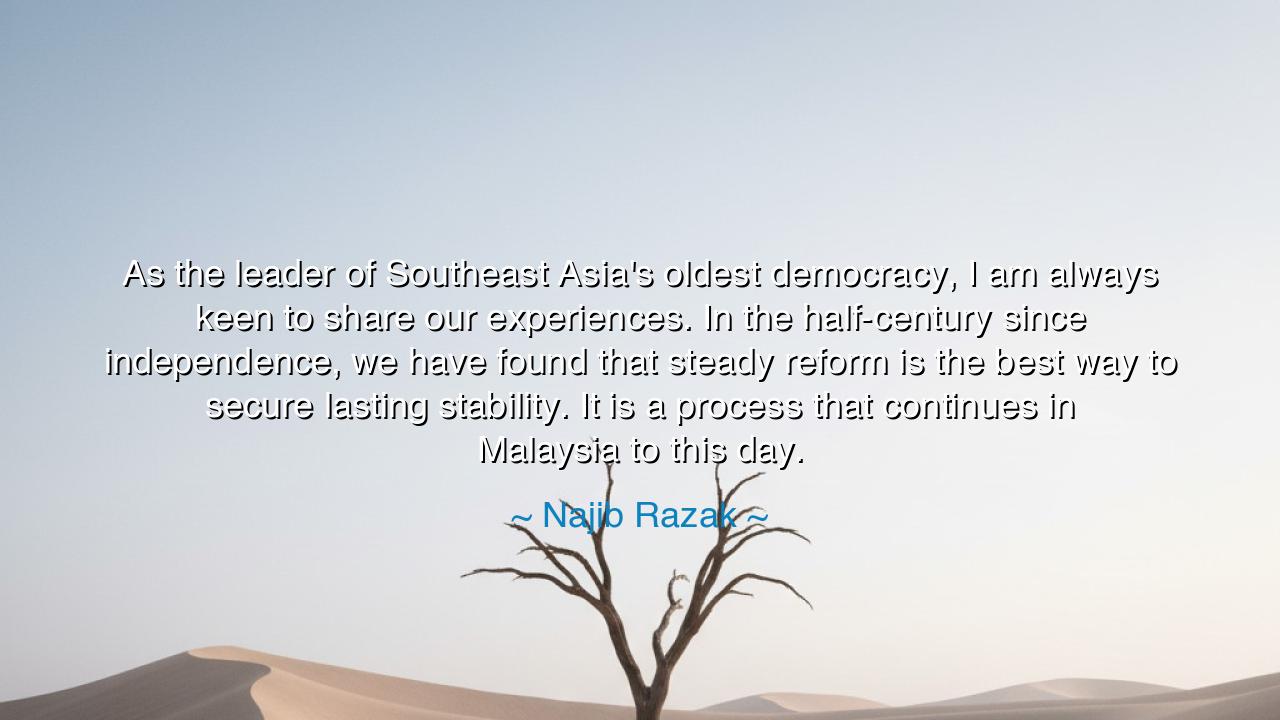
As the leader of Southeast Asia's oldest democracy, I am always
As the leader of Southeast Asia's oldest democracy, I am always keen to share our experiences. In the half-century since independence, we have found that steady reform is the best way to secure lasting stability. It is a process that continues in Malaysia to this day.






Hear, O children of the future, the words of Najib Razak, a leader whose reflections on the path of independence and reform offer a powerful lesson in the pursuit of stability. "As the leader of Southeast Asia's oldest democracy, I am always keen to share our experiences. In the half-century since independence, we have found that steady reform is the best way to secure lasting stability. It is a process that continues in Malaysia to this day." These words are not merely a recounting of a nation’s history, but a declaration that true progress comes not through sudden upheavals, but through steady, deliberate change that honors the past while forging a path forward.
In the ancient world, the concept of reform was no stranger to great civilizations. The Roman Republic, for example, was built on principles of gradual reform, balancing the powers of the Senate and the people. Over time, the Romans restructured their political system, expanding rights, instituting reforms, and adapting their governance to meet the needs of a growing empire. However, their path was not without struggle. Caesar Augustus, in his rise to power, understood that lasting stability in the Roman world could only be achieved by reform that respected the legacy of the Republic while bringing necessary change. His reign marked a period of transition that laid the groundwork for the Pax Romana, an era of peace and prosperity that lasted for centuries. His story reminds us that true stability is not achieved through revolution, but through a balance of progress and tradition.
In Malaysia, as Razak shares, the journey toward independence was marked by a similar commitment to gradual reform. When Malaysia gained its independence in 1957, it did not immediately step into a utopia of freedom. The fledgling nation faced numerous challenges: ethnic divisions, economic disparity, and the lingering effects of colonial rule. Yet, like the ancient empires before them, the leaders of Malaysia understood that lasting stability would only come through steady reform—a process of evolving governance and societal norms that balanced the needs of all its people. Razak’s reflection on the half-century since independence echoes this idea: that lasting change does not come from swift, unconsidered actions, but from a careful, ongoing process of transformation.
Consider the example of Japan after World War II. Like Malaysia, Japan faced a moment of tremendous upheaval and challenge after its defeat in 1945. Under the guidance of General Douglas MacArthur, Japan embarked on a series of reforms—political, social, and economic—that transformed the nation. These changes were not immediate, nor were they without conflict. Yet over decades, Japan emerged as a global power, rooted in the stability created by these gradual reforms. Razak’s words, though spoken in a different context, speak to the same truth: that the path to stability is forged through a long, deliberate process of reform—one that respects the past, adapts to the present, and looks forward to the future.
The lesson of Razak’s words is one of patience and wisdom: independence is not a singular event, but a continuous journey. The pursuit of stability in any nation requires reform that is both steady and thoughtful, a process that listens to the lessons of history while embracing the opportunities of the present. Like the Romans and Japanese, Malaysia understood that the true work of nation-building lies not in immediate changes, but in a careful, sustained effort to adapt and grow. Razak’s leadership reflects this understanding—a commitment to ensure that the principles of independence are not only upheld, but strengthened through a process of ongoing reform.
So, O children, take this wisdom to heart: as you walk your own path in life, understand that true stability does not come from hasty actions or fleeting successes, but from the slow, steady work of reform. Whether in your personal life, your community, or the larger world, seek to be patient with the changes you wish to see. Understand that true independence is not just the breaking free of old chains, but the building of something new, step by step, with care and purpose. Let the example of Malaysia and the ancient civilizations guide you, showing that stability and progress are the fruits of a well-tended process of reform.
In the end, O children, know this: lasting change and freedom are never quick, and they are never easy. But they are the product of deliberate action, constant renewal, and the wisdom to adapt to the times while respecting the roots from which we came. Let this wisdom guide your own journey, and may you, like the great leaders before you, always understand that true stability lies in the careful balance between independence and reform, a balance that can carry us forward into a brighter future.






AAdministratorAdministrator
Welcome, honored guests. Please leave a comment, we will respond soon